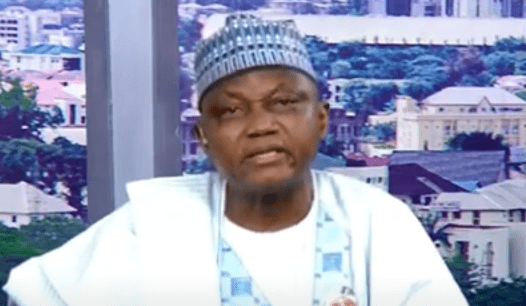Headline
Presidency Knocks Lawmaker Over Missing N89tn Stamp Duty Claim

Following the controversies trailing a claim of a missing sum of N89.09 trillion allegedly lost from siphoned stamp duty charges, the Presidency on Tuesday said such is false.
It also said the entire banking sector deposit in Nigeria does not amount to half of N89tn.
“It is now evident that the consultants and petitioners’ claim of a missing N89tn from stamp duty appears false and a figment of their malicious imaginations. The same set of consultants claimed in 2016 there was N20tn to be collected. It was found to be false. The entire banking sector deposit is not even up to half of N89 trillion.
“Indeed, if the Federal Government can find N89tn Naira, it can pay off all its debt, both foreign and local currency and all state government debts and still have over N10tn left,” a statement signed on Tuesday evening by the President’s spokesman, Garba Shehu, read.
The statement is titled, “Stamp duty: facts Nigerians need to have.”
READ ALSO: You Know The People Who Nurtured Boko Haram, FG Fires Back At Atiku
In an interview with BBC Hausa last Friday, the lawmaker representing the Kazaure, Roni, Gwiwa, Yankwashi Constituency of Jigawa State at the lower chambers alleged that the Presidential Committee on the Reconciliation and Recovery of All Stamp Duties has accused some government agencies of sabotaging the committee’s efforts.
According to Kazaure, who said he serves as the committee’s secretary, it was discovered that N89.09tn has so far been realised from deductions by banks but these funds have not made it to the FG’s coffers.
He alleged connivance by some critical operatives of the regime, including the Central Bank of Nigeria, the Office of the Secretary to the Government of the Federation and the Protocol Department of the State House, preventing him from briefing President Muhammadu Buhari on the findings.
But reacting to the claims on Tuesday, the Presidency said while there was a committee empowered by the President to look recover a sum of N20tn allegedly lost to the Nigerian Inter-bank Settlement System, the President rescinded his approval upon realising the actual plan of said committee.
It explained that this “anomaly” arose because certain characters apparently formed a cartel with collaborators in the Nigerian Postal Service and were allegedly collecting and pocketing tokens on banking transactions.
Soon after, a non-government organisation posited to the regime that the Nigerian government had lost the sum of over N20tn to the Nigerian Inter-bank Settlement System between 2013-2016 in this regard, claiming that the said sum could be recovered and paid back into the government coffers.
READ ALSO: 2023: Why I Will Not Vote For Atiku – Bode George
“The consultants asked to be paid a professional fee of 7.5 per cent and were placed under the supervision of the Secretary to the Government of the Federation.
“Following the lack of progress in the promised recovery, the late Chief of Staff to the President, Abba Kyari wrote on March 8, 2018, to the SGF conveying a presidential directive that following the lack of progress and several expressed concerns received, the activities of the consultants be discontinued.
“In the aftermath of this dismissal, the consultants sued the government. A court of competent jurisdiction subsequently ruled in favour of the government,” the Presidency noted in the statement.
It said arising from the outcome of the litigation and the controversy on the legally responsible agent for collecting this levy, the regime caused an amendment to the law and removed NIPOST from the duty of its collection.
Having lost a potentially “lucrative” line of “business”, Shehu claimed that the sacked characters returned to the drawing board to formulate one form of trick or another to intimidate the government but the vigilant teams of the administration kept them at bay.
“Lately, they returned to the government through Hon. Muhammadu Kazaure with a plan to track the so-called lost stamp duties with the erstwhile consultant as chairman and Gudaji as secretary.
“When it emerged that the petitioner and lead consultant of the committee the President had dissolved via the late Abba Kyari’s letter of March 28 had masqueraded himself and re-emerged as the chairman of the new recovery committee championed by Gudaji, the President rescinded the approval he gave and asked that it be stopped from operating under the seal of his office,” Shehu further explained.
Buhari’s decision, he said, was premised on concerns relating to natural justice and fair hearing in having the Chief Justice of the Federation as a committee member and a serving member of the House of Representatives as Secretary, which are not in line with Section 5(1),(a)&(b) of the 1999 constitution of the Federal Republic of Nigeria (as amended).
The Presidency proceeded to answer questions raised by Kazaure in the BBC Hausa interview.
On the CBN’s Investors and Exporters window, which Kazaure claimed stood at $171 billion dollars as of 2020, it said “Contrary to Kazaure’s assertion, the I&E window is NOT an ‘account’ where foreign exchange is deposited. It is simply a platform for trading foreign exchange.
“As of April 2020, the total amount of foreign exchange traded (either bought or sold) in the window was about $171bn. The amount does not mean that we have $171bn stacked away in some vault or saved in any account.”
On accusations of the CBN loaning N23.4tn to some banks, Shehu said “the total balance sheet of the CBN is not anywhere near N23tn. So how can it give such an amount in loans to any or some banks?”
READ ALSO: Alleged Violence: Davido’s Cousin Sina Rambo, Wife Split
Responding to claims about a N13trillion loan to the federal government from the Financial Markets Derivative Quotes he said according to the Debt Management Office, the total amount of Nigeria’s domestic debt as of September 2022 is N21.6tn.
“Is Kazaure suggesting that a small company in Lagos holds over 60 per cent of Nigeria’s domestic debt? Of the N21.6tn domestic debt, only N4.5tn are in Treasury Bills. How then can a company in Lagos hold more treasury bills (N13tn) than the entire treasury bills issued by the Federal Government?” Shehu queried.
According to him, the President has not ignored these matters and a duly authorised committee under the Attorney-General and Minister of Justice, Abubakar Malami is “working to reconcile, recover and transfer all Stamp Duties into Stamp Duties Central Account. The work is ongoing, it is not finished yet and the President will continue to show his keen interest in the matter of Stamp Duty collection.”
PUNCH
Headline
South Korea, Japan Protest China, Russia Aircraft Incursions

South Korea and Japan reacted furiously on Wednesday after Chinese and Russian military aircraft conducted joint patrols around the two countries, with both Seoul and Tokyo scrambling jets.
South Korea said it had protested with representatives of China and Russia, while Japan said it had conveyed its “serious concerns” over national security.
According to Tokyo, two Russian Tu-95 nuclear-capable bombers on Tuesday flew from the Sea of Japan to rendezvous with two Chinese H-6 bombers in the East China Sea, then conducted a joint flight around the country.
The incident comes as Japan is locked in a dispute with China over comments Prime Minister Sanae Takaichi made about Taiwan.
READ ALSO:China Backs Nigeria, Warns Against Foreign Interference
The bombers’ joint flights were “clearly intended as a show of force against our nation, Defence Minister Shinjiro Koizumi wrote on X Wednesday.
Top government spokesman Minoru Kihara said that Tokyo had “conveyed to both China and Russia our serious concerns over our national security through diplomatic channels”.
Seoul said Tuesday the Russian and Chinese warplanes entered its air defence zone and that a complaint had been lodged with the defence attaches of both countries in the South Korean capital.
“Our military will continue to respond actively to the activities of neighbouring countries’ aircraft within the KADIZ in compliance with international law,” said Lee Kwang-suk, director general of the International Policy Bureau at Seoul’s defence ministry, referring to the Korea Air Defence Identification Zone.
READ ALSO:Trial For South Korean Woman Accused Of ‘Suitcase Murders’ Starts Today
South Korea also said it deployed “fighter jets to take tactical measures in preparation for any contingencies” in response to the Chinese and Russian incursion into the KADIZ.
The planes were spotted before they entered the air defence identification zone, defined as a broader area in which countries police aircraft for security reasons but which does not constitute their airspace.
Japan’s defence ministry also scrambled fighter jets to intercept the warplanes.
Beijing later Tuesday confirmed it had organised drills with Russia’s military according to “annual cooperation plans”.
READ ALSO:South Korean Actress Kim Sae-ron Found Dead In Seoul Apartment
Moscow also described it as a routine exercise, saying it lasted eight hours and that some foreign fighter jets followed the Russian and Chinese aircraft.
Since 2019, China and Russia have regularly flown military aircraft into South Korea’s air defence zone without prior notice, citing joint exercises.
In November last year, Seoul scrambled jets as five Chinese and six Russian military planes flew through its air defence zone.
Similar incidents occurred in June and December 2023, and in May and November 2022.
READ ALSO:Russia Insists Ukraine Must Cede Land Or Face Continued Military Push
Meanwhile, Tokyo said Monday it had scrambled jets in response to repeated takeoff and landing exercises involving fighter jets and military helicopters from China’s Liaoning aircraft carrier as it cruised in international waters near Japan.
It also summoned Beijing’s ambassador after military aircraft from the Liaoning locked radar onto Japanese jets, the latest incident in the row ignited by Takaichi’s comments backing Taiwan.
Takaichi suggested last month that Japan would intervene militarily in any Chinese attack on the self-ruled island, which Beijing claims as its own and has not ruled out seizing by force.
AFP
Headline
Thousands Reported To Have Fled DR Congo Fighting As M23 Closes On Key City

Fierce fighting rocked the eastern Democratic Republic of Congo on Tuesday as the Rwanda-backed M23 militia rapidly advanced towards the strategic city of Uvira, with tens of thousands of people fleeing over the nearby border into Burundi, sources said.
The armed group and its Rwandan allies were just a few kilometres (miles) north of Uvira, security and military sources told AFP.
The renewed violence undermined a peace agreement brokered by US President Donald Trump that Kinshasa and Kigali signed less than a week ago, on December 4.
Trump had boasted that the Rwanda-DRC conflict was one of eight he has ended since returning to power in America in January.
READ ALSO:Ambassadorial Nominees: Ndume Asks Tinubu To Withdraw List
With the new fighting, more than 30,000 people have fled the area around Uvira for Burundi in the space of a week, a UN source and a Burundian administrative source told AFP.
The Burundian source told AFP on condition of anonymity he had recorded more than 8,000 daily arrivals over the past two days, and 30,000 arrivals in one week. A source in the UN refugee agency confirmed the figure.
The Rwanda-backed M23 offensive comes nearly a year after the group seized control of Goma and Bukavu, the two largest cities in eastern DRC, a strategic region rich in natural resources and plagued by conflict for 30 years.
Local people described a state of growing panic as bombardments struck the hills above Uvira, a city of several hundred thousand residents.
“Three bombs have just exploded in the hills. It’s every man for himself,” said one resident reached by telephone.
READ ALSO:South Africa Beat DR Congo In shootout To Finish Third At AFCON
“We are all under the beds in Uvira — that’s the reality,” another resident said, while a representative of civil society who would not give their name described fighting on the city’s outskirts.
Fighting was also reported in Runingo, another small locality some 20 kilometres (12 miles) from Uvira, as the M23 and the Rwandan army closed in.
Burundi views the prospect of Uvira falling to Rwanda-backed forces as an existential threat, given that it sits across Lake Tanganyika from Burundi’s economic capital Bujumbura.
The city is the main sizeable locality in the area yet to fall to the M23 and its capture would essentially cut off the zone from DRC control.
READ ALSO:Stampede Kills 37 During Army Recruitment In Congo Capital
Burundi deployed about 10,000 soldiers to eastern DRC in October 2023 as part of a military cooperation agreement, and security sources say reinforcements have since taken that presence to around 18,000 men.
The M23 and Rwandan forces launched their Uvira offensive on December 1.
Rich in natural resources, eastern DRC has been choked by successive conflicts for around three decades.
Violence in the region intensified early this year when M23 fighters seized the key eastern city of Goma in January, followed by Bukavu, capital of South Kivu province, a few weeks later.
– Regional risk –
The peace deal meant to quell the fighting was signed last Thursday in Washington by Congolese President Felix Tshisekedi and his Rwandan counterpart Paul Kagame, with Trump — who called it a “miracle” deal — also putting his signature to it.
READ ALSO:FULL LIST: US To Review Green Cards From 19 ‘Countries Of Concern’ After Washington Shooting
The agreement includes an economic component intended to secure US supplies of critical minerals present in the region, as America seeks to challenge China’s dominance in the sector.
But even on the day of the signing, intense fighting took place in South Kivu, where Uvira is located, which included the bombing of houses and schools.
Witnesses and military sources in Uvira said that Congolese soldiers fleeing the fighting had arrived in the city overnight Monday and shops were looted at dawn.
Several hundred Congolese and Burundian soldiers had already fled to Burundi on Monday, according to military sources, since the M23 fighters embarked on their latest offensive from Kamanyola, some 70 kilometres north of Uvira.
Since the M23’s lightning offensive early this year, the front had largely stabilised over the past nine months.
Burundian President Evariste Ndayishimiye warned in February there was a danger of the conflict escalating into a broader regional war, a fear echoed by the United Nations.
Headline
‘Santa Claus’ Arrested For Possessing, Distributing Child Sexual Abuse Material

A 64-year-old man from Hamilton Township has been arrested in the United States after investigators linked him to the possession and distribution of child sexual abuse material.
The suspect, identified as Mark Paulino, had been working as a “Santa for hire” at holiday events, a role that placed him in repeated contact with children.
Mercer County officials said the investigation began on 4 December when detectives were alerted to suspicious online activity involving the uploading of child pornography from a residence in Hamilton Township. The probe quickly identified Paulino, a retired elementary school teacher, as the person involved.
READ ALSO:Nigerian Ringleader Of Nationwide Bank Fraud, Money Laundering Jailed In US, Says FBI
Police stated that Paulino had presented himself online as a retired teacher and had recently performed as Santa Claus for photographs and private, corporate, and organisational events. “Because this role involved direct, repeated contact with children, detectives worked around the clock to secure a search warrant,” authorities explained.
The warrant was executed on 5 December, during which police seized multiple items regarded as evidentiary. Paulino was taken into custody without incident and charged with possession and distribution of child sexual abuse materials, as well as endangering the welfare of a child.
Prosecutors have filed a motion to detain him pending trial. The investigation remains ongoing, and authorities have urged members of the public with relevant information to come forward.

 Headline5 days ago
Headline5 days agoJUST IN: Soldiers Announce Military Takeover Of Govt In Benin Republic

 News5 days ago
News5 days agoRufai Oseni Breaks Silence On Alleged Suspension From Arise TV

 News5 days ago
News5 days agoOAU Unveils Seven-foot Bronze Statue Of Chief Obafemi Awolowo

 Politics4 days ago
Politics4 days agoJUST IN: Tinubu Holds Closed-door Meeting With Rivers, Ebonyi Govs

 News4 days ago
News4 days agoWhy My Lineage Qualifies Me For Awujale Throne — K1 De-Ultimate

 Politics4 days ago
Politics4 days agoTinubu, Six APC Governors Hold Closed-door Meeting At Aso Villa

 News5 days ago
News5 days agoWoman Taken For Dead Wakes Up Inside Coffin Few Minutes To Her Cremation

 Politics5 days ago
Politics5 days agoAmbassadorial Nominees: Ndume Asks Tinubu To Withdraw List

 News3 days ago
News3 days agoGroup Wants Edo AG Professorship Investigated

 News5 days ago
News5 days agoHow I and Obey’s Son Escaped Getting Caught In Benin’s Coup —Dele Momodu






























